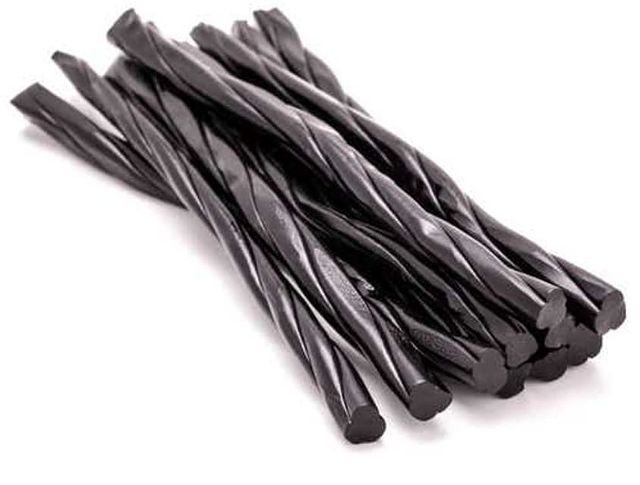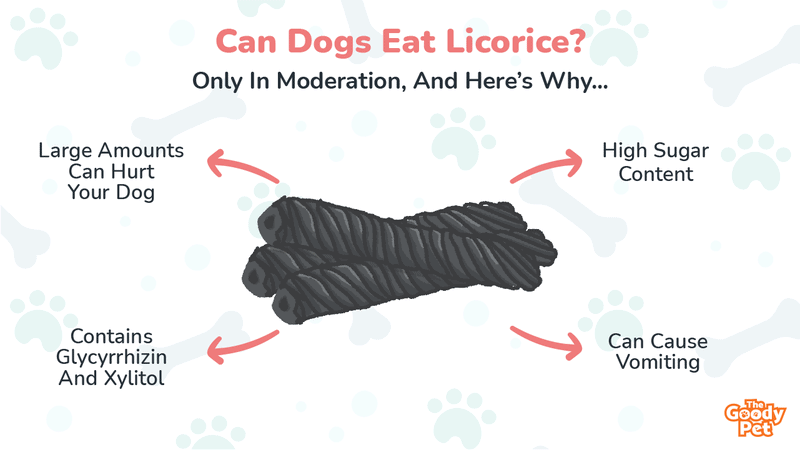When it comes to giving our furry friends human food, safety is the most important. We have to be sure that it is safe for them and know how much of it they can have. And for black licorice, we shall see in this article if our furry friend can have it.
Yes, dogs can eat black licorice but only under special circumstances. This is due to a substance called glycyrrhizin found in black licorice. Glycyrrhizin can alter your pooch’s metabolism and raise blood pressure to a fatal extent. The intake of black licorice in dogs should hence be strictly controlled.
In this article, we shall see if the consumption of black licorice can kill dogs and why dogs like black licorice. We shall also understand more about the situation when black licorice may be suitable for doggies and how much black licorice to give them. However, let’s first dive into the answer to the question of whether dogs can eat black licorice or not.
Can Dogs Eat Black Licorice?
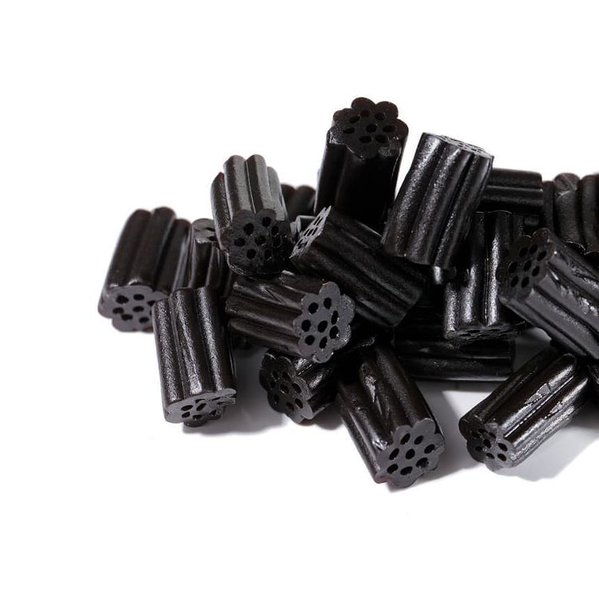
Yes, dogs can only eat black licorice under special circumstances, such as for medical purposes. The glycyrrhizin contained in the compound in black licorice is responsible for giving licorice its sweet taste.
In fact, glycyrrhizin is 30 to 50 times sweeter than normal sugar or sucrose and could be a better alternative to it. However, glycyrrhizin can greatly affect your doggie’s metabolism by altering its blood pressure to a fatally high level. So, dogs should not have black licorice incorporated into their daily diet.
Can Dogs Eat Black Licorice Roots?
No, dogs cannot eat black licorice roots. Black licorice root still contains glycyrrhizin, a substance that affects the metabolism of your furry friend and also increases their blood pressure.
Can Dogs Eat Black Licorice Jelly Beans?
No, dogs cannot eat black licorice jelly beans either. Black licorice jelly beans still contain black licorice making them unsuitable for your furry friend.
Can Dogs Eat Black Licorice Candy?
No, dogs cannot eat black licorice sweets or candy. In fact, black licorice sweet is more dangerous than black licorice root because it contains xylitol. Besides Xylitol, the additional glycyrrhizin content makes black licorice sweet unsuitable for your doggie.
What Happens If A Dog Eats Licorice?
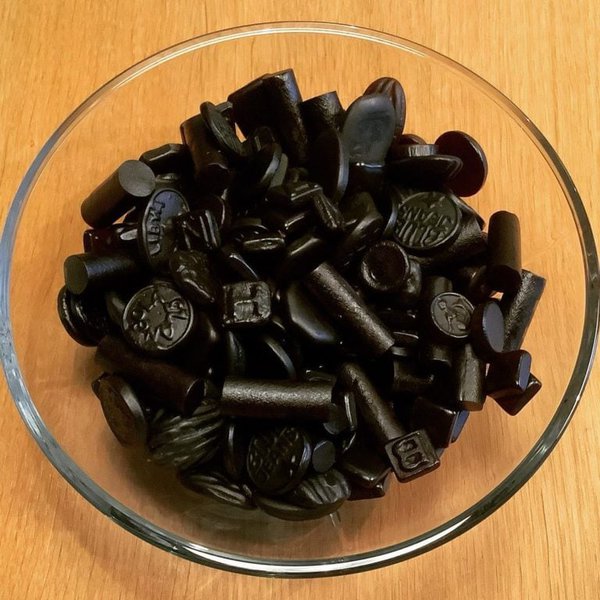
Depending on the amount of black licorice eaten by your furry friend, it may experience vomiting, diarrhea, and nausea. If you suspect that your pooch ate an entire package of licorice, never fail to let your veterinarian know.
If it is just a small amount of licorice, your doggie should be fine. However, still, watch out for symptoms that may show up.
Will Black Licorice Hurt My Dog?
A few consumptions of black licorice wouldn’t hurt your furry friend. However, black licorice has the potential to hurt your dog when eaten in large amounts at once or more frequently in small amounts.
Your doggie could fall sick from eating black licorice, especially when it has consumed black licorice in a very large amount or smaller amounts but frequently without restriction.
Additionally, commercially manufactured black licorice contains xylitol. Your doggie will very likely fall sick from it, especially when it ingests large amounts of xylitol.
Will Dogs Die If They Eat Licorice?
Generally, if your pooch consumes black licorice in large amounts, it won’t kill it. However, this quantity could be fatal at this point. Your dog may experience a wide range of stomach discomforts such as vomiting, diarrhea, lethargy, and high blood pressure.
The life of your doggie could be more at risk if the black licorice eaten contains xylitol. Xylitol in dogs is known to be fatal. About 0.1 oz of xylitol can kill a 65 lbs dog. You should check for xylitol presence in the black licorice in case your doggie ate it in your absence.
It is always prudent to immediately inform your veterinarian if your pooch ate a large amount of black licorice.
Why Do Dogs Like Black Licorice?
The obvious reason our furry friends like black licorice is because it tastes very sweet. But our doggies don’t know about the danger of consuming it.
They are drawn to it by the pleasing sensation it brings when they chew it. For this reason, you should take caution whenever you have black licorice in your home.
Is Black Licorice Good For Dogs?
No, black licorice is not good for dogs when given to them regularly. Even as a treat, black licorice is not the best option for your furry companion.
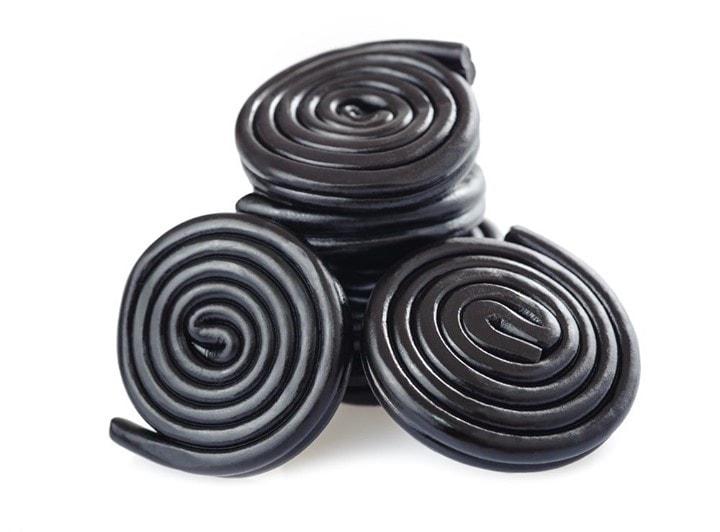
When Can Dogs Eat Black Licorice?
There are situations where black licorice is beneficial to doggies. For instance, when our canine companion suffers from inflammatory diseases.
Examples of such diseases are eczema, stomach discomfort, and stomach ulcers. Black licorice can be used to treat such conditions.
These are some of the conditions where you should attempt to give your furry friend black licorice. Even with this, you will have to seek the opinion of your veterinarian before offering your doggie black licorice.
How Much Black Licorice Should I Give My Dog?
Remember that black licorice is best given to your pooch for health reasons. The amount of black licorice given to your pooch in this situation should be very moderate and under the guidance of your veterinarian.
In humans, 2 ounces of black licorice for 14 days is fatal. We should expect a very smaller amount than that in humans to also be fatal in our furry friends.
In comparison, it will be safe to give our doggies less than 0.1 oz (2.84 g) of black licorice. Additionally, being dogs, it is not safe to feed them black licorice for more than three consecutive days.
Five Twizzlers or nine wheeled pieces of black licorice weigh about 2 ounces. This means that our furry friends only need less than a quarter of one Twizzler or one wheeled piece of black licorice to be safe for them.
